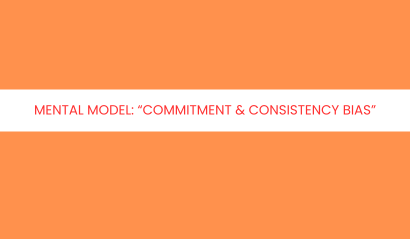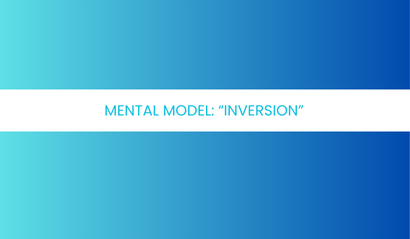Mental Model: Incentive-caused Bias
Have you ever wondered why some people, even the most well-intentioned ones, make decisions that seem biased or irrational? One of the key reasons is a cognitive bias known as incentive-caused bias. This psychological phenomenon influences decision-making in a way that aligns with personal incentives rather than objectivity or ethical considerations.
In this blog, we will delve deep into the origins of incentive-caused bias, explore real-world examples, and discuss strategies to mitigate its effects.
The Origin of Incentive-Caused Bias
The term incentive-caused bias was popularized by Charlie Munger, the billionaire investor and business partner of Warren Buffett. Munger, a student of human psychology and cognitive biases, frequently spoke about how incentives drive behavior—sometimes leading people to act against their ethical or rational judgments.
The concept itself, however, is rooted in psychology and behavioral economics. The idea that incentives shape behavior is a fundamental principle in psychology, particularly in the work of B.F. Skinner, who studied operant conditioning. According to Skinner, people tend to repeat behaviors that are rewarded and avoid those that are punished. When incentives are strong enough, they can override rationality, ethics, and even common sense.
Understanding Incentive-Caused Bias
Incentive-caused bias occurs when an individual’s decisions and behaviors are significantly influenced by the rewards or consequences associated with a particular action. This bias can affect individuals across different fields, from business and finance to healthcare and politics.
There are two key elements at play in incentive-caused bias:
- Motivation by Reward: People naturally seek rewards, whether they are monetary, professional, or social.
- Rationalization of Actions: Individuals may unconsciously justify their actions if they align with their incentives, even if those actions are questionable or unethical.
This bias is often unintentional, meaning that even well-meaning individuals may be unaware of how incentives are shaping their choices.
Real-World Examples of Incentive-Caused Bias
1. The Financial Sector: The 2008 Financial Crisis
One of the most infamous cases of incentive-caused bias was the 2008 financial crisis. Mortgage brokers, investment bankers, and rating agencies all had strong financial incentives to approve subprime mortgages and package them into complex financial instruments. Despite the risks, individuals and institutions continued promoting these financial products because they were highly profitable. This ultimately led to a market collapse, showcasing how incentives can cloud rational judgment.
2. The Medical Industry: Pharmaceutical Companies and Doctors
Doctors are supposed to prescribe medications that are in the best interest of their patients. However, pharmaceutical companies often provide financial incentives to doctors in the form of speaking fees, sponsored conferences, or gifts. Studies have shown that doctors who receive such incentives are more likely to prescribe medications from the sponsoring company, even when alternative treatments may be more effective or affordable.
3. Corporate World: Sales Commissions and Customer Exploitation
In many industries, salespeople earn commissions based on the number of products they sell. This can lead to aggressive selling tactics, misrepresentation of product benefits, or even outright fraud. For example, the Wells Fargo scandal involved employees creating fake bank accounts to meet sales targets, leading to a massive reputational and financial fallout for the company.
4. Journalism and Media: Sensationalism Over Truth
Media companies rely on advertising revenue, which is driven by audience engagement. This creates an incentive for journalists and editors to prioritize sensational news over balanced reporting. As a result, some media outlets may exaggerate stories, spread misinformation, or focus on divisive topics that generate more clicks and views, rather than providing objective journalism.
5. Politics: Campaign Funding and Policy Decisions
Politicians rely on campaign donations to fund their election campaigns. Often, these donations come from corporate entities, lobbyists, or special interest groups. This creates an incentive for politicians to push policies that favor their donors, sometimes at the expense of the general public. This is why industries like fossil fuels, pharmaceuticals, and defense contractors wield significant influence over legislation.
How to Recognize and Avoid Incentive-Caused Bias
Since incentive-caused bias operates at a subconscious level, avoiding it requires conscious effort. Here are some strategies to help recognize and mitigate its effects:
1. Awareness and Education
The first step in combating this bias is understanding that it exists. By educating yourself and others about incentive-caused bias, you can begin to notice when incentives might be influencing decisions inappropriately.
2. Follow the Money
Whenever you are evaluating a recommendation, ask yourself: Who benefits from this decision? Understanding financial or professional incentives behind a suggestion can reveal potential biases.
3. Seek Independent Opinions
To counteract biased decisions, consult independent sources who do not have a stake in the outcome. For example, if a doctor recommends an expensive treatment, seeking a second opinion from another physician who has no ties to a pharmaceutical company can help ensure objectivity.
4. Incentivize Ethical Behavior
Organizations and policymakers should design incentive structures that align with ethical behavior. For instance, sales teams should be rewarded not just for hitting quotas but also for customer satisfaction and retention.
5. Implement Accountability Measures
Organizations should have checks and balances to prevent conflicts of interest. For example, financial advisors should be required to disclose commissions and incentives that may influence their recommendations.
6. Encourage Long-Term Thinking
Many incentive-caused biases stem from short-term gains. Encouraging long-term thinking in business, politics, and personal decision-making can help counteract this bias. For example, companies that reward employees for ethical behavior and sustainable growth rather than just quarterly profits tend to make better long-term decisions.
Conclusion
Incentive-caused bias is a powerful force that influences decision-making in many aspects of life. Whether in finance, healthcare, media, or politics, this bias can lead to unethical, irrational, or even harmful decisions.
By understanding how incentives shape behavior and taking proactive steps to mitigate their effects, individuals and organizations can make more rational, ethical, and beneficial decisions. Recognizing this bias is the first step toward creating a more transparent and accountable society.
So next time you encounter a decision—whether your own or someone else’s—take a moment to ask: What incentives are at play here? The answer may reveal more than you think.







